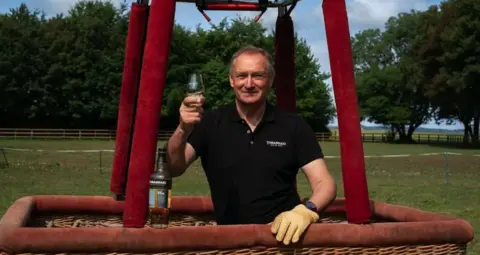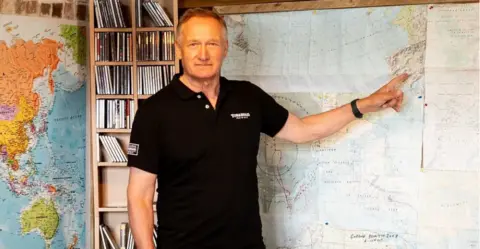British explorer to cross Atlantic in open basket
 PA Media
PA MediaA British explorer is preparing to take off on his latest challenge after it was postponed last year due to bad weather.
Sir David Hempleman-Adams and two friends are hoping to be the first to fly across the Atlantic in an open basket gas balloon.
The team plan to collect air samples for scientists during the trip.
They hope to take off from Maine in North America in June and touch down a few days later on this side of the Atlantic.
"We're going slightly earlier, by six weeks, so we'll start looking for a slot from the first of June, so fingers crossed," Sir David told BBC Wiltshire.
He will be accompanied by American balloon manufacturer, Bert Padelt and Swiss explorer, scientist and entrepreneur, Dr Frederik Paulsen.
They will be conducting experiments during the journey, one study will aim to find out how particles from forest fires travel through the atmosphere affecting conditions such as asthma.
"Most aeroplanes are all pretty high up in the 30,000 ft (9,144 m) range," Sir David said.
"We'll be flying at about 8,000 ft (2,438 m) so it'll be completely new atmospheric experiments in that sense."
The team also hope to collect samples to discover new microbes that could lead to the discovery of new natural proteins, which could be used in the development of new medicines, biofuels, bioplastics or agritech.
 Torabhaig Single Malt Whisky
Torabhaig Single Malt WhiskySir David, who is from Wiltshire, has already crossed the Atlantic twice in an open basket balloon, but this would be the first flight using hydrogen.
"Normally it would be helium," he said, "but that costs enormous amounts of money.
"Hydrogen is virtually free so it's much, much better.
"We'll go from a little town in northern Maine, go across Newfoundland and out over the Atlantic.
"It doesn't matter where we land in Europe, as long as I've got dry feet. It could even be Morocco, I don't care.
"We'll be taking a bottle of Torabhaig whisky to slug when we land."
"We're not trying to beat any records. All we want to do is try and cross the Atlantic safely and do a bit of scientific research," he added.
Follow BBC Wiltshire on Facebook, X and Instagram. Send your story ideas to us on email or via WhatsApp on 0800 313 4630.
